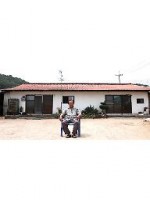130, Suyeonggangbyeon-daero,
Haeundae-gu, Busan, Republic of Korea,
48058
DATABASE
Dream House by the Border (2013)
Trailer
< Gyeong-gye-e-seo Kkum-kku-neun Jip >
The film establishes a link between the collective memory and individual memory of residents living near a DMZ, under military control, and the slow process of settling into their new surroundings. It was the Park dictatorship that took the initiative to clear this land of its mines in the late 60s, in order to put an end to the country’s famine; the rescue plan was modelled on the Israeli kibbutz system. The director, whose father was born in the Northern part of Korea, i...more
| Genre | Documentary | Production Status | |
|---|---|---|---|
| Running Time | 89min | Release Date | - |
| Country | South Korea, France | Rating | |
| Language | Co-Production | Y | |
| Original |
-
Number of Screens : 1
-
Total Admissions : 157
-
Total Gross : $329
As of Jan 25, 2026
-
Cinema DAL | cinemadal@cinemadal.com
- Republication, copying or redistribution by any means is prohibited without the prior permission of KOFIC and the original news source.












